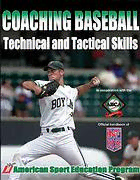
Coaching baseball technical and tactical skills PDF
Preview Coaching baseball technical and tactical skills
CCooaacchhiinngg BBAASSEEBBAALLLL TTeecchhnniiccaall aanndd TTaaccttiiccaall SSkkiillllss American Sport Education Program with Tom O’Connell Human Kinetics contents preface v PART I Teaching and Evaluating . . . . . . . . . . . . . . . . .1 chapter 1 Teaching Sport Skills 3 chapter 2 Evaluating Technical and Tactical Skills 9 PART II Teaching Technical Skills . . . . . . . . . . . . . . . .17 chapter 3 Offensive Technical Skills 19 chapter 4 Defensive Technical Skills 63 PART III Teaching Tactical Skills . . . . . . . . . . . . . . . . .149 chapter 5 Offensive Tactical Skills 151 chapter 6 Defensive Tactical Skills 177 PART IV Planning for Teaching . . . . . . . . . . . . . . . . . .207 chapter 7 Season Plans 209 chapter 8 Practice Plans 219 PART V Game Coaching . . . . . . . . . . . . . . . . . . . . . . . .237 chapter 9 Preparing for Games 239 chapter 10 During and After the Game 253 index 259 about ASEP 264 iii preface If you are a seasoned baseball coach, surely you have experienced the frustration of watching your players perform well in practice, only to find them underperforming in games. In your playing days, you likely saw the same events unfold. Teammates, or perhaps even you, could tear the cover off the ball in batting practice and snag all of the ground balls in drills, but could not transfer that kind of performance to games. Although this book will not provide you with a magical quick fix to your team’s problems, it will help you prepare your players for game day. Whether you are a veteran coach or are new to coaching, Coaching Baseball Technical and Tacti- cal Skills will help you take your game to the next level by providing you with the tools you need to teach your team the game of baseball. Every baseball coach knows the importance of technical skills. The ability of a player to field a fly ball, make a strong throw, block a pitch in the dirt, lay down a bunt, or throw a curveball can significantly affect the outcome of a game. The book discusses the basic and intermediate technical skills necessary for your team’s success, including both offensive and defensive skills. You will learn how to detect and correct errors in your athletes’ performance of those skills and then help them transfer the knowledge and ability that they gain in practice to execu- tion in games. In addition to learning about technical skills, the book focuses on tactical skills, including offensive skills like the sacrifice bunt, getting out of a rundown and stealing third base and defensive skills such as pickoff plays, defending the first- and-third double steal and double-play defenses. The book discusses the “tactical triangle,” an approach that teaches players to read a situation, acquire the knowl- edge they need to make a tactical decision and apply decision-making skills to the problem. To advance this method, the book covers important cues that help athletes respond appropriately when they see a play developing, including important rules, game strategies and the strengths and weaknesses of opponents. The book also covers planning at several levels—the season plan, practice plans and game plans. Sample games approach practice and season plans are offered. The season plan lays out a season based on the skills in this book and the practice plans include a description of eight practice sessions, covering elements such as the length of the practice session, the objective of the practice, equipment needed, v vi Preface warm-up, practice of previously taught skills, teaching and practicing new skills, cool-down and evaluation. Sample drills and games, as mentioned in both the games and traditional approach practice plans, can also be found in the Coaching Baseball Technical and Tactical Skills online course. Of course, playing the games is what your practices eventually lead to. The book shows you how to prepare long before the first game, including dealing with issues such as communicating with players, parents, officials and the media, scouting your opponent and motivating your players. You will learn how to control your team’s performance on game day by establishing routines and how to make decisions during the game, such as removing pitchers, making substitutions and setting a batting order. PART I TTeeaacchhiinngg aanndd EEvvaalluuaattiinngg Being a good coach takes more than knowing the sport of baseball. You have to go beyond that and fi nd a way to teach your athletes how to be better ball players. You also need to know how to evaluate your players to fi nd effective ways to improve their performance. In chapter 1 we will go over the fundamentals of teaching sport skills. We will fi rst provide you with a general overview of your sport and talk with you about the importance of being an effective teacher. Next, we will defi ne some important skills, helping you get a better understanding of technical and tactical skills and the traditional and games approaches to coaching. We will build on the knowledge of how to teach sport skills with the evaluation of technical and tactical skills in chapter 2. We will discuss the importance of evaluating athletes, review the core skills that you should assess and describe how you can assess them. Chapter 2 stresses the importance of preseason, in- season and postseason evaluation and provides you with sample tools that you can use to evaluate your players. By learning how to teach and evaluate your players, you will be better prepared to help them improve their performance. 1
